Heartburn-Free Holiday: A Dietitian’s Guide to Preventing Acid Reflux this Holiday Season
The holiday season is a time of joy, celebration, and enjoying some of our favorite foods with family and friends! However, for those dealing with issues like acid reflux, GERD, and LP, this time of year can be a significant source of anxiety. As a digestive health dietitian who recovered from severe acid reflux/GERD, I understand how overwhelming it can feel around the holiday season. It can feel isolating and frustrating to worry about your digestive issues throughout the holiday season, but you do not have to figure it out alone!
In this blog post, I'll provide you with valuable tips to navigate the holiday season with these conditions, ensuring you can still partake in the festivities with everyone, while also prioritizing supportive actions to help you feel your best.
Plan Ahead
Before diving into the holiday festivities, take some time to plan your meals and gatherings. If you anticipate the dining options to be limited, this is an opportunity to bring an acid-reflux-friendly dish or two. Some examples can include Parmesan Roasted Carrots, Sage and Thyme Roasted Sweet Potatoes, or a Kate Salad with Delicata Squash and Pumpkin Seeds.
Communicate Your Needs
Before the event, consider reaching out to the host or hostess to chat about the types of food choices and timing of the meal so you can be prepared. By communicating about potential food allergens or ingredients before the event, you can feel more confident when the holiday comes around by knowing what you can eat as well as plan for potential digestive triggers.
Don't Skip Meals
While it may be tempting to skip meals to "save room" for holiday feasts, this can worsen digestive issues. Regular meals and snacks can help promote stabilize blood sugar levels and nd prevent overeating at holiday events which can trigger acid reflux.
Don’t go starving
You’ve probably heard that an earlier dinner is best for those with acid reflux. If the dinner is later than ideal for you, have a high-protein snack or mini-meal beforehand so you can eat a little lighter during the event. Having a snack will also help you feel more in control of your choices during the event.
Incorporate Mindful Eating
During holiday gatherings, it's easy to overindulge in food as we enjoy conversations or reminisce over a memory of a particular dish. It can be helpful to pay attention to portion sizes and chew your food slowly, as these steps can prevent overeating throughout the day. Additionally, eating mindfully can help us to appreciate the flavors and textures of the foods we enjoy during the holiday season!
Choose Wisely: Navigating Your Unique Trigger Foods
At holiday parties, you'll likely be faced with an array of food options. Opt for dishes that are less likely to trigger your digestive issues, based on your own unique needs. For those with acid reflux, avoiding trigger foods like chocolate, alcohol, and spicy dishes can be beneficial. Choosing alternatives such as a pumpkin or pecan-based dessert can help you feel satisfied while avoiding uncomfortable symptoms later on. It is important to note that each individual’s trigger foods may be different, and working with a skilled GI dietitian can help in determining what foods may be helpful for you to minimize!
Be Prepared With Your Digestive Toolbox
Carrying acid reflux support such as RefluxRaft to take after holiday meals is an excellent way to ease anxiety around mealtimes and prevent post-meal acid reflux. I recommend 1-2 tsp after meals to prevent acid reflux. SHOP RefluxRaft here!
Packing FODZYME digestive enzymes can also help if you’re sensitive to high FODMAP foods such as garlic, onion, wheat, beans, or lactose. These little packets have helped my clients so much! Use code MOLLYRD for 15% off FODZYME here.
Practice Stress Management
Stress can exacerbate acid reflux symptoms - and stress can especially be present during the holidays! When we are stressed, we’re also more likely to reach for foods that may not help us feel our best. Incorporating stress-relief techniques into your daily routine, such as meditation or 3-5 minutes of diaphragmatic breathing may help reduce stress levels and prevent acid reflux.
The holiday season should be a time of joy, not discomfort. As a digestive health dietitian, I encourage you to follow these tips to help you navigate the holidays while managing GERD, acid reflux, or LPR. Remember that it's essential to prioritize your health and well-being. By planning ahead, making mindful food choices, and incorporating stress-reduction techniques, you can fully enjoy the festivities without compromising your digestive health. If you’re looking for more support from one of our GI-specialized dietitians, HERE!

